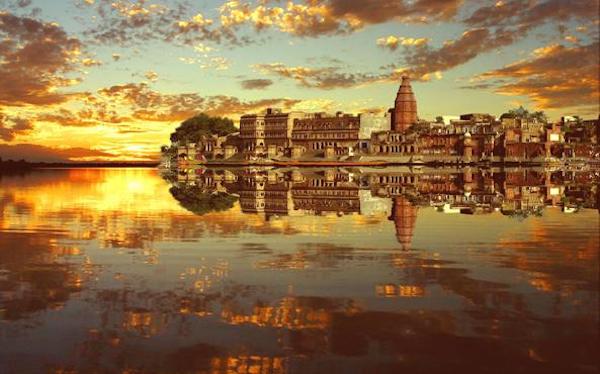 It is alright to be aware of one’s great heritage and every nation must discover it through the genius of the race. However the knowledge of this past must not become a fetter from the ever-forward march of mankind. This happens characteristically when we are too much attached to the form and forget the spirit within it. While the form can be traced through books and culture and traditions, the spirit has to be discovered within. It has to be awakened and lived. That is what is indicated in the story of Shiva carrying the dead corpse of Mata Sati whom Lord Vishnu dismembers. She is the Divine Mother no doubt but She must return in higher and more luminous form as Gauri. This same truth is indicated in the reverse stitching of the goat’s head on the trunk of slain Daksha.
It is alright to be aware of one’s great heritage and every nation must discover it through the genius of the race. However the knowledge of this past must not become a fetter from the ever-forward march of mankind. This happens characteristically when we are too much attached to the form and forget the spirit within it. While the form can be traced through books and culture and traditions, the spirit has to be discovered within. It has to be awakened and lived. That is what is indicated in the story of Shiva carrying the dead corpse of Mata Sati whom Lord Vishnu dismembers. She is the Divine Mother no doubt but She must return in higher and more luminous form as Gauri. This same truth is indicated in the reverse stitching of the goat’s head on the trunk of slain Daksha.
Let me give a couple of examples. Take the study of the Vedas. While it is beautiful to know the metres and the Rishis and the shlokas what is truly important is to realise the truths within, otherwise, we are lost in endless arguments and disputes over the written word. No wonder the Lord of the Gita as also Sri Aurobindo reminds us to go beyond the written word, sabda-brahma ativartate. On the other hand, if we get into the experience contained within it then we discover that the mantra can be received in any language and the Vedas are not a closed and finished book. The last chapters of God’s book are yet to be written. Otherwise we do the same mistake as the mawlawi does in believing that their book is the last one and their conception of God the only true one. The Vedas are an initiation into the profound mysteries of existence, the first book as Dawn descended upon man. It has luminous hints of future noons towards which we must strive.
Take another more recent example. The well-known story of Anustup chand is circulating with reference to the Ramayana. But I smile because we have missed something crucial in this beautiful story. The death of the bird in love, its tremendous grief at losing its mate which moves the heart of the seer, is it not suggestive of Ramayana itself. Does it not indicate with all the subtlety and finesse of the ancient seers that the ignorant animal love of the bird and the beast yet contains within it the seeds of a much more luminous divine love typified in the story of Rama and Sita? Is not Valmiki’s emotion for a mere bird something truly sublime suggestion of the heart of love in the eyes of the seer. Remember Sri Aurobindo’s poem Seer Deep Hearted. But in our eagerness for knowledge, we have missed out on love. Hence Ramayana is celebrated as the victory of good over evil whereas it is the story of the conversion of the Asura in us. Ravana’s death restores him to his original status as a bhakta of the Lord. That made it contemporary and relevant.
We could go on with many more examples. But the point is we should be careful in resurrecting the past to keep its spirit intact lest it is stifled once more in the forms that the Time Spirit has broken. The past should be a springboard towards future and not a chain to pull us back.



